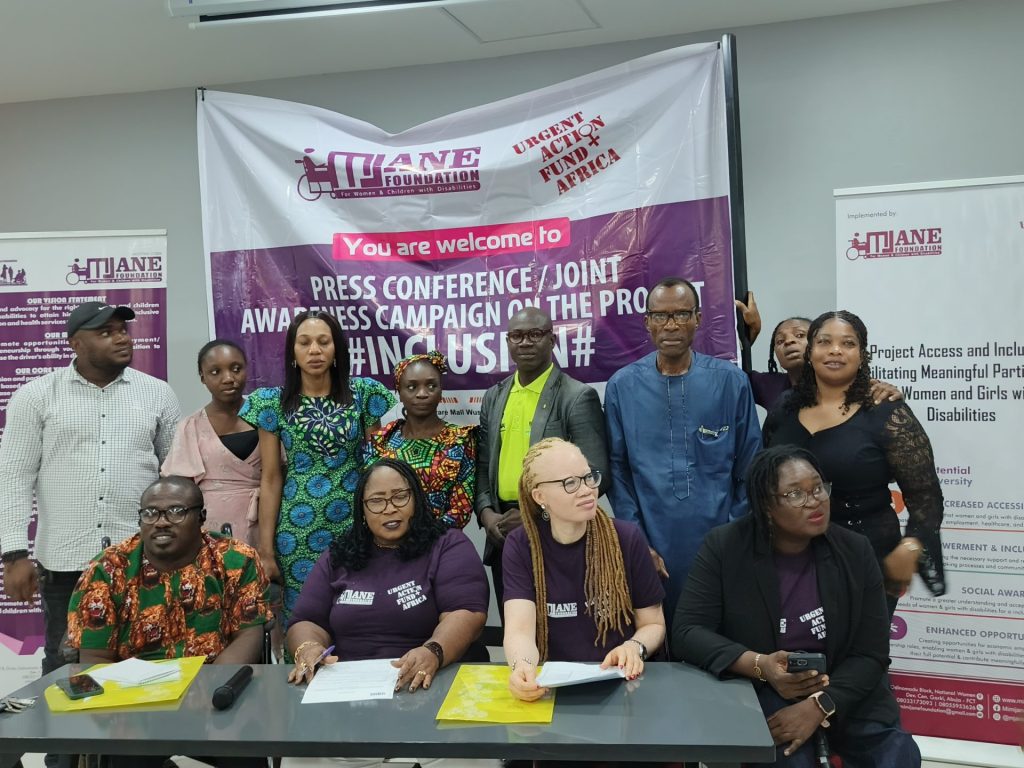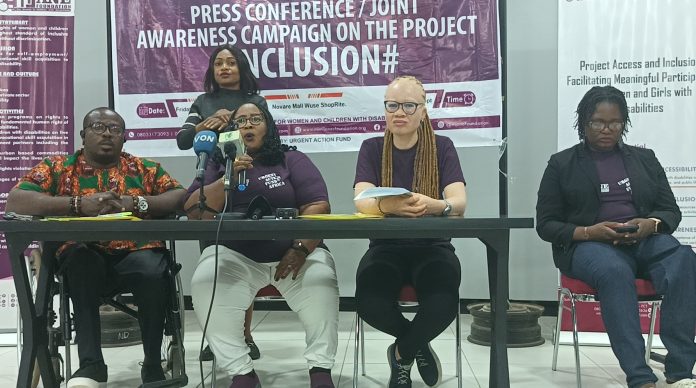Abuja, Nigeria – In a groundbreaking step towards promoting the rights of women and girls with disabilities, the Mimijane Foundation, in collaboration with other disability advocacy groups, hosted a press conference on September 27, 2024, to highlight the urgent need for amendments to the Discrimination Against Persons with Disabilities (Prohibition) Act, 2018. The foundation is pushing for more inclusive policies that will address the unique challenges faced by women and girls with disabilities across Nigeria.
The 2018 Disability Act, signed into law by former President Muhammadu Buhari after nine years of persistent advocacy, marked a historic milestone in the fight for the rights of persons with disabilities in Nigeria. The law prohibits all forms of discrimination against people with disabilities and mandates sanctions, including fines and prison sentences, for violators. It also establishes a five-year transitional period to modify public buildings, structures, and automobiles, making them accessible to persons with disabilities. However, despite the significant progress made, advocates argue that the Act falls short in addressing the specific challenges faced by women and girls with disabilities, and they are calling for an urgent review to bridge these gaps.

Bringing Women’s Issues to the Forefront
Ambassador Mube Awala Beatrice, Executive Director of the Mimijane Foundation for Women and Children with Disabilities, took the lead in highlighting the core issues during the press conference. In her opening remarks, while acknowledging the support of Urgent Action Fund Africa, she emphasized that while the Act represents a significant step towards promoting disability rights in Nigeria, it lacks provisions that cater specifically to the needs and rights of women and girls with disabilities, leaving them vulnerable to multiple forms of discrimination and abuse.
“Women and girls with disabilities face unique challenges that are often overlooked. They are subjected to multiple layers of discrimination due to both their gender and disability status,” Amb. Beatrice explained. “We need amendments to the Act that specifically protect their rights, ensure access to healthcare, education, and economic opportunities, and safeguard them against gender-based violence.”
The Mimijane Foundation’s position paper, which was presented to the National Assembly House of Representatives Committee on Disabilities, calls for key amendments to the Act, focusing on areas such as access to healthcare, inclusive education, and protection from discrimination and abuse. These proposed changes aim to close the gaps that prevent women and girls with disabilities from fully participating in society.
The Fight for Reproductive Health Rights
One of the most pressing concerns raised during the conference was the lack of provisions addressing the sexual and reproductive health rights of women with disabilities. In many instances, women with disabilities face forced abortions, sterilizations, and neglect in healthcare settings, especially during childbirth, making it imperative for the Act to be amended to protect their health and rights.
Cynthia Ukachi, the Program Manager of the Mimijane Foundation, spoke passionately about the importance of this issue. “Our position paper focuses on Part 1 and Part 7 of the Act, but we believe all components should be gender-sensitive,” she stated. “Every law court should have a disability deck officer to assist women with disabilities in accessing justice. Furthermore, legal practitioners working with the government should provide pro bono services to women with disabilities, ensuring that they receive fair treatment and representation.”
Cynthia’s emphasis on prioritizing the sexual and reproductive health rights of women with disabilities struck a chord with attendees, highlighting how deeply entrenched societal stereotypes have often excluded these women from accessing the healthcare services they need. “We cannot claim to be an inclusive society while ignoring the health and well-being of our women with disabilities,” she stressed. “It’s time for policymakers to act and ensure that these rights are protected.”
Inclusive Education and Addressing Violence Against Women with Disabilities
Another focal point of the proposed amendments is the inclusion of girls with disabilities in Nigeria’s education system. Despite international commitments, many girls with disabilities are denied access to education due to societal and cultural barriers. The Mimijane Foundation, alongside other advocacy groups, is calling for legislative provisions that guarantee equal educational opportunities for these girls, ensuring they are not left behind.
Florence Marcus, a renowned gender and disability rights advocate, emphasized the critical need for this change. “The exclusion of girls with disabilities from educational opportunities not only robs them of their right to learn and grow but also impoverishes our society by denying us the potential contributions they could make,” she argued. “It’s crucial that we address the cultural barriers, neglect, and systemic exclusion that keep them out of classrooms.”
Florence also criticized the current Act for failing to protect women with disabilities from gender-based violence. “Deep-rooted stereotypes prevent women with disabilities from participating effectively in politics, education, and other areas of life,” she lamented. “Our National Disability Law, as it stands, does not adequately cover the rights of women with disabilities. We are urging the National Assembly to address issues such as forced marriages, abuse, and gender-based violence, ensuring that women with disabilities are protected.”
The Need for Stricter Penalties and Inclusive Governance
In addition to these pressing issues, Comrade Chris Agbo, Chairman of the National Association of Persons with Physical Disabilities (NAPWPD) FCT Chapter, called for stricter penalties within the Act to ensure its effective implementation. He expressed frustration that smaller African countries, such as Kenya and Rwanda, have made significant strides in including persons with disabilities in governance, while Nigeria continues to lag behind.
“It is a shame that Nigeria has not made as much progress as smaller countries in Africa when it comes to inclusive governance,” Comrade Agbo remarked. “If persons with disabilities are not represented at decision-making tables, our needs will always be an afterthought. We need to be included in all committees of governance and on the boards of Ministries, Departments, and Agencies (MDAs) to ensure that our voices are heard, and our issues are adequately addressed.”
A Call to Action for Lawmakers
As the press conference drew to a close, the various speakers united in their call to action for lawmakers to consider the proposed amendments to the Disability Act. They urged the National Assembly to work toward creating a society where women and girls with disabilities are empowered, protected, and given equal opportunities to thrive.
“We are not just asking for amendments; we are demanding our rights,” Amb. Mube Awala Beatrice declared. “The Discrimination Against Persons with Disabilities (Prohibition) Act, 2018, was a critical first step, but now it’s time to build on that foundation and ensure that the law truly reflects the needs and aspirations of all persons with disabilities, especially women and girls.”
The Path Forward
The press conference and the Mimijane Foundation’s advocacy efforts signal a new era in the fight for disability rights in Nigeria. The proposed amendments, if adopted, would transform the Discrimination Against Persons with Disabilities Act into a more comprehensive and inclusive piece of legislation that addresses the unique challenges faced by women and girls with disabilities.
This call to action is a powerful reminder that true inclusion means leaving no one behind. By ensuring that the rights of women and girls with disabilities are protected, Nigeria can set an example for other African nations and the world, demonstrating a commitment to equality, justice, and human rights for all.
As the country awaits the National Assembly’s response, advocates remain hopeful that this push for change will lead to a more inclusive and accessible Nigeria, where women and girls with disabilities can live, learn, work, and thrive without fear of discrimination or exclusion.
The journey continues, but with dedicated voices like those from the Mimijane Foundation and their partners, the vision of an inclusive society is no longer just a dream – it’s becoming a reality.


